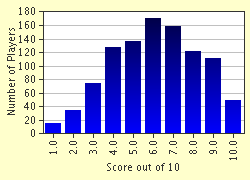Quiz Answer Key and Fun Facts
1. The symbol (~) used in many URLs (Web addresses), is called which of the following?
2. What is the dot over the letter "i" called?
3. According to the OED, which word has more definitions than any other word in English?
4. What is a pangram?
5. The following sentence is an example of what term? "Madam, I'm Adam".
6. No word in modern usage in the English language is considered a true rhyme for any of the following words: month, silver, or orange.
7. The symbol used to indicate a sharp, as in a musical note, is known by what term? It is also known as the hashmark.
8. "In the year of 1492, Columbus sailed the ocean blue" is an example of what term?
9. Which word has definitions which are antonyms of each other?
10. What term refers to replacing a disagreeable or possibly offensive term or phrase with a more agreeable one?
Source: Author
57wordsmith
This quiz was reviewed by FunTrivia editor
agony before going online.
Any errors found in FunTrivia content are routinely corrected through our feedback system.

